LGBT books – Best children’s and YA stories for schools
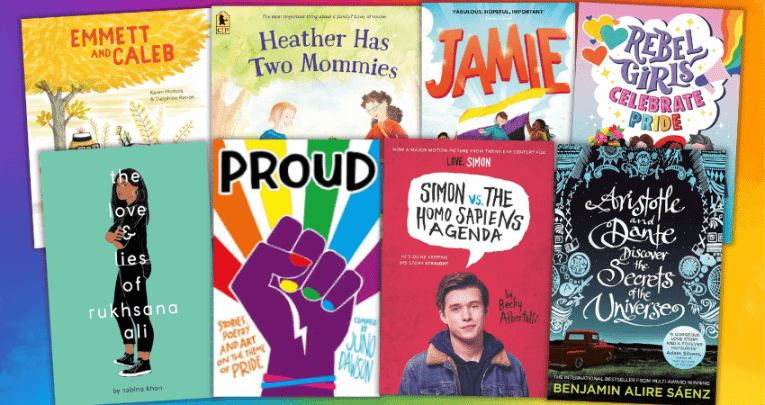
Make sure your library shelves are as inclusive as you’d like your school to be, with these empowering and empathetic reads…

- by Teachwire
- Classroom expertise and free resources for teachers
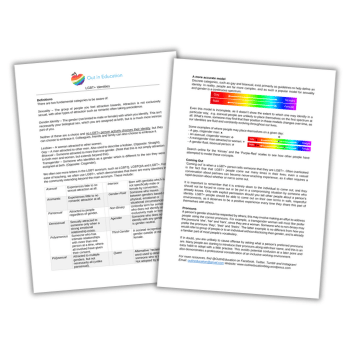
Enrich your library and broaden students’ perspectives with this brilliant selection of LGBT books for schools…
Best children’s LGBT books
Reading is important for all young people, at every stage of development, because it shapes how they see the world.
But if young people who are LGBT+, or who have LGBT+ families, never see themselves in the pages of their favourite books, they risk seeing the world as a place that doesn’t value or include them.
Each year, Just Like Us, the LGBT+ young people’s charity, releases a reading list of books with LGBT+ themes, from new releases to timeless classics, to ensure every child is able to see themselves reflected.
The books below are hand-selected by the Just Like Us education team. Download the latest reading list, featuring 218 books for all Key Stages, for free.
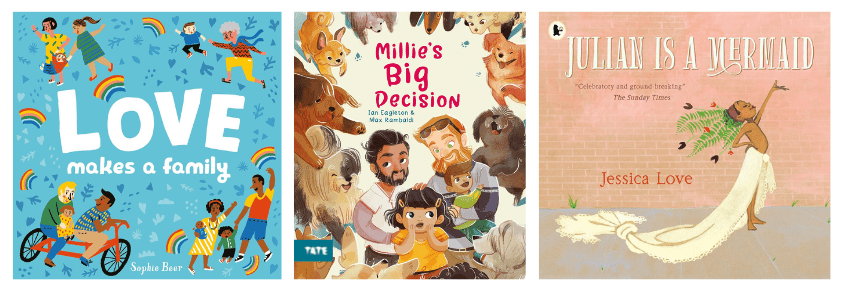
Love Makes a Family
Sophie Beer (EYFS)
This colourful board book features diverse families all united by one thing: love.
Millie’s Big Decision
Ian Eagleton & Max Rambaldi (EYFS / KS1)
Millie’s Big Decision is a picture book dealing with themes of loss, hope and acceptance, in which main character Millie happens to have two dads.
Julian is a Mermaid
Jessica Love (EYFS / KS1)
Julian’s life is changed when he sees three enthralling women dressed as mermaids. Swishes of coral blue and intricately illustrated underwater scenes depict Julian’s daydream of becoming a mermaid.
When Nana sees Julian proudly transformed into his version of a mermaid, the empty space surrounding him and Nana’s furious face suggest a devastating reaction.
Many children will recognise the notions of rejection and invisibility, but Nana gifts Julian a pearl necklace to complete his glamorous outfit.
They join a procession of mermaids “like you, honey” and a riot of colour reflects Julian’s feelings of joy as he finds his true place in the world.
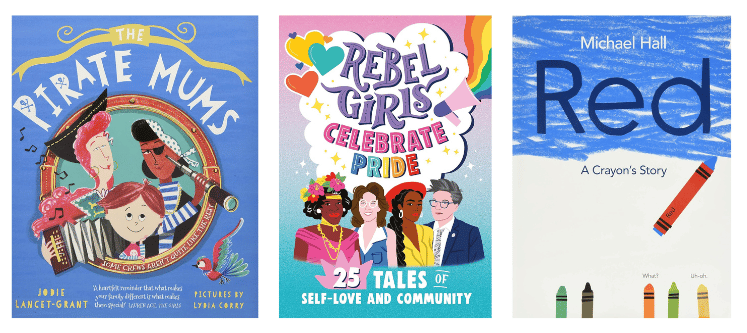
Pirate Mums
Jodie Lancet-Grant & Lydia Corry (EYFS / KS1)
This humorous adventure, following Billy and his two pirate mums, reminds children that what makes families different is what makes them special.
Rebel Girls: Celebrate Pride
Elena Favilli (KS1 / KS2)
An inspiring collection of true stories of incredible LGBT+ women, girls and non-binary people.
Red: A Crayon’s Story
Michael Hall (KS1 / KS2)
Red crayon is not very good at being red. Every time he tries to draw strawberries, hearts and cherries, everything turns out blue!
His teacher thinks he needs more practice, his parents feel he needs to mix with other colours and many berate him for his lack of effort – after all, his label says ‘red’ and that’s the way he came from the factory!
Eventually, a new friend offers Red the chance to be himself and Red discovers that he is, of course, Blue!
A colourful, charming, witty picture book about the damage of forcing labels onto others and the freedom and delight that being yourself brings.
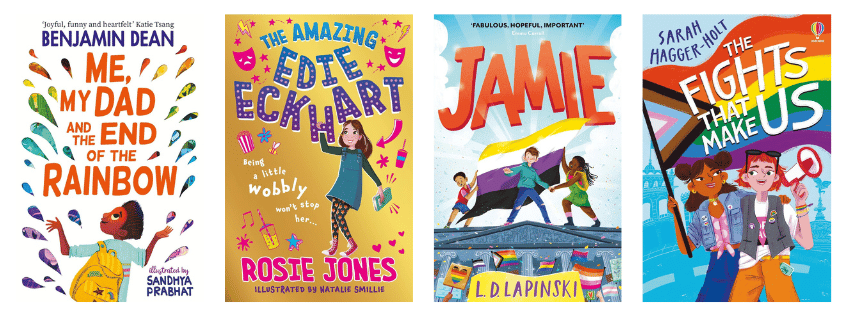
Me, My Dad and the End of the Rainbow
Benjamin Dean (KS2)
Archie sets off on an adventure with his two best friends to understand his family structure, navigating topics of belonging and identity in a joyful way.
The Amazing Edie Eckhart
Rosie Jones (KS2)
Like comedian and author Rosie Jones, the funny and fearless Edie Eckhart has cerebral palsy, but “being a little wobbly won’t stop her”!
Jamie
L.D. Lapinski (UKS2 / KS3)
Jamie is a non-binary 11-year-old, and their story highlights the power of friendship and resilience in creating change.
The Fights That Make Us
Sarah Hagger-Holt (UKS2 / KS3)
The Fights That Make Us follows two friends discovering LGBT+ history, and figuring out how it relates to their lives today.

Thank you to teacher, author and English consultant Ian Eagleton for the below choices…
Emmett and Caleb
Karen Hottois and Delphine Renon, translated by Sarah Ardizzone
Emmett and Caleb explores the relationship between the two main characters as they journey through birthdays, hard times and the beauty of the changing seasons.
The two friends share precious moments together such as watching a stunning sunset or waving goodbye to summer as autumnal leaves fall.
Their relationship is never defined, leaving it open to interpretation, but it’s lovely to share in their quiet, tender friendship.
Heather Has Two Mommies
Lesléa Newman and Laura Cornell
Heather Has Two Mummies was first published in 1989. While many lesbian mums were thrilled to see themselves in a children’s book, there were a number of people who were disgusted by the inclusion of a different family unit.
The book is a colourful, gentle exploration of what it means to be a family. Heather and her two mums picnic, play and bake together.
When Ms Molly asks the class to paint a picture of their families, we see, through beautiful, child-like watercolour illustrations, how different every family is. It’s a message that still needs to be acknowledged.
Jerome By Heart
Thomas Scotto and Oliver Tallec, translated by Claudia Zoe Bedrick and Karin Snelson
This vivid picture book shows us the beauty of true friendship and the feeling of safety it engenders.
Told simply in the first person, young Raphael shares with us his feelings of tender affection for his best friend, Jerome.
With echoes of Walt Whitman’s We Two Boys Together Clinging and Josh Gilgun’s The Way They Are, the book sensitively considers how the day-to-day rhythm of life can be enriched by love.
Despite his parents’ disapproval, the story ends on a life-affirming note. Raphael’s spirit cannot be vanquished and the boys’ love remains “strong as a fortress”.
Best YA LGBT books
School library, reading and literacy consultant Barbara Band sets out the essential LGBT books you need in your secondary school library…
Literature has a unique power to forge resilience and send a message that ‘you are not alone’. This is particularly true for young people who may be struggling with their sexuality or gender identity.
Providing LGBT books in your school library can be a great way to supplement your school’s ongoing work to promote diversity and inclusion.
However, the reality is that some secondary school libraries lack the availability of LGBT books. Schools may struggle to identify relevant texts that are engaging for young readers while also being age-appropriate and providing real educational value.
The LGBT books below can educate and inspire your students while also helping to build a more diverse and inclusive school community – one that is respectful and understanding of both their peers and the world they live in.
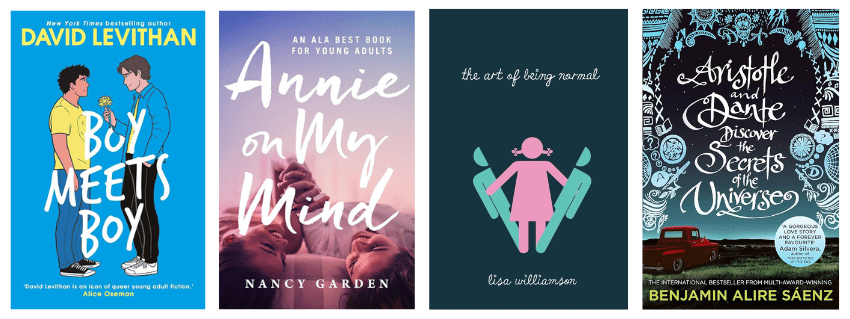
Boy Meets Boy
David Levithan, HarperCollins
David Levithan sets his debut novel in a utopian town where everybody gets on and sexual preferences aren’t an issue. But when Paul meets Noah and falls in love, things get complicated.
This is a light-hearted, upbeat and quirky story, set in a hopeful world that is centred on the issues of friendship, love, trust and relationships. It deals with familiar teen issues and, as a short read, it’s a great choice for reluctant readers.
Annie on my Mind
Nancy Garden, Farrar, Straus and Giroux
Trending
Liza Winthrop attends private school, wants to be an architect and lives in an upscale neighbourhood. Annie Kenyon attends state school, wants to be a singer and lives with her Italian immigrant parents in a run-down area of New York.
When they meet at an art gallery, they instantly become friends and fall in love over time. But can their love survive?
This ground-breaking book is considered to be the first lesbian coming-of-age story. It’s an emotional read. Although the protagonists’ attitudes may feel old fashioned for young readers, their struggle is relatable.
The Art of Being Normal
Lisa Williamson, David Fickling Books
David was born male but in his head he is female and wants to transition. His parents think he’s gay and only his best friends know his secret. When Leo, born a girl, starts at David’s school, an intriguing friendship develops between them.
This well-researched, emotional and heartfelt book is less about the journey of transitioning and more about friendship and family. It’s ideal for students aged 12+, although it does contain some bullying and name-calling.
Aristotle and Dante Discover the Secrets of the Universe
Benjamin Alire Saenz, Atria Books
Aristotle and Dante are Mexican-Americans. Ari is full of self-doubt and doesn’t like himself very much. Dante is a know-it-all who has relationships with girls but admits that he’d rather be kissing boys.
When their friendship develops, it becomes a bond that will change both their lives.
The story is about a boy who wants to accept himself and learn to love others. Although it deals with lots of issues including gay relationships, loss, mental health and racism, the main focus is on friendship and how the support of others can motivate you to change yourself.
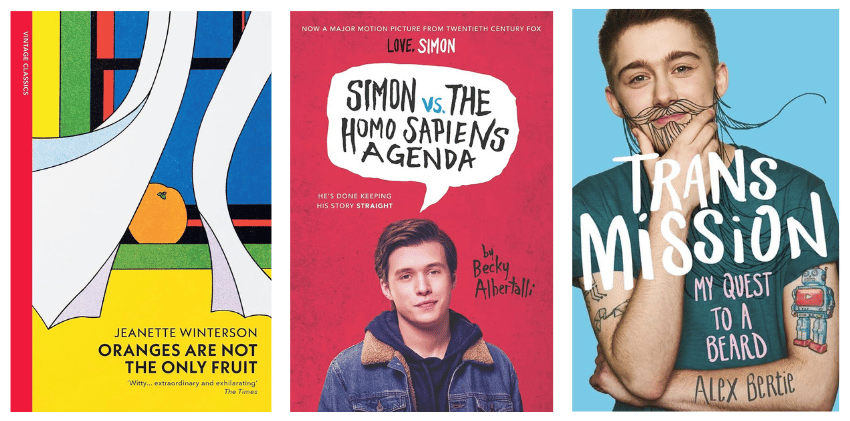
Oranges are Not the Only Fruit
Jeanette Winterson, Penguin
Our semi-autobiographical protagonist Jeanette has been adopted by a religious mother and submissive father, where she is being raised to be a missionary.
Aged 16, she falls in love with a girl which leads to an exorcism by the church and ostracization from her local community.
This is a short, quirky story about love, religion and oppression. It deals with individuality and new beginnings. The sex in this book is insinuated rather than explicit. It’s an appropriate text for more confident readers.
Simon vs The Homo Sapiens Agenda
Becky Albertalli, Penguin
Simon Spier is 16, not-so-openly gay and still working out who he really is. He has also developed a huge crush on his internet pen-pal, Blue, and has no idea of Blue’s identity.
When one of Simon’s emails to Blue falls into the wrong hands, things get messy.
This is a feel-good read about coming-out, relationships, empathy and self-acceptance. It has a range of diverse characters and deals with several important issues. Note that the book does contain swearing, homophobic bullying and underage drinking.
Trans Mission: My Quest to a Beard
Alex Bertie, Hachette
Alex Bertie was born female, but realised he was a transgender man at age 15. This book details his journey living as a male and the start of his physical transitioning.
As a first-hand account in an authentic and easy-to-read voice, this memoir gives practical and down-to-earth advice. It doesn’t presume any prior knowledge about transitioning and gives clear, simple explanations and sensible advice.
Alex is also a popular YouTuber, so students may already have heard of him.
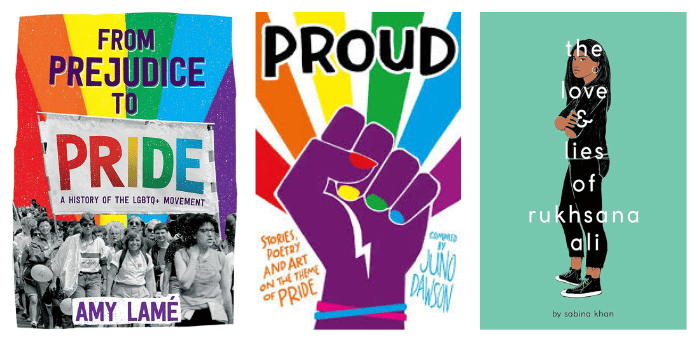
From Prejudice to Pride: A History of LGBTQ+ Movement
Amy Lame, Wayland
Amy Lame, a well-known TV personality and LGBT+ activist, has written a comprehensive and accessible historical overview of the LGBT+ movement and people. The book is well-laid out with clear and accessible text broken up by photos, illustrations and sub-headings.
This excellent book gives good coverage of the history of the LGBTQ+ movement. It’s particularly suitable as an introduction for younger audiences.
Proud
Edited by Juno Dawson, Stripes
These 12 short stories and poems cover a multitude of themes and emotions, including a wide range of LGBT+ characters. They have all been written by LGBT+ authors and each story or poem has been illustrated by an LGBT+ artist.
These upbeat stories with happy endings and beautiful illustrations will appeal to reluctant readers. The stories feature contemporary fiction with a touch of fantasy.
The Love and Lives of Rukhsana Ali
Sabina Khan, Scholastic
Rukhsana lives with her conservative Muslim parents who favour her brother. She tries to stick to their rules, being an obedient daughter at home. But at school she is able to be herself.
When she is caught kissing her girlfriend, she is sent to Bangladesh where she is thrown into a terrifying world.
With themes of lesbianism, coming out and being true to yourself, this book is emotional and evocative. The book contains mature content and language more suitable for older readers.
Why LGBTQ+ visibility in books is essential
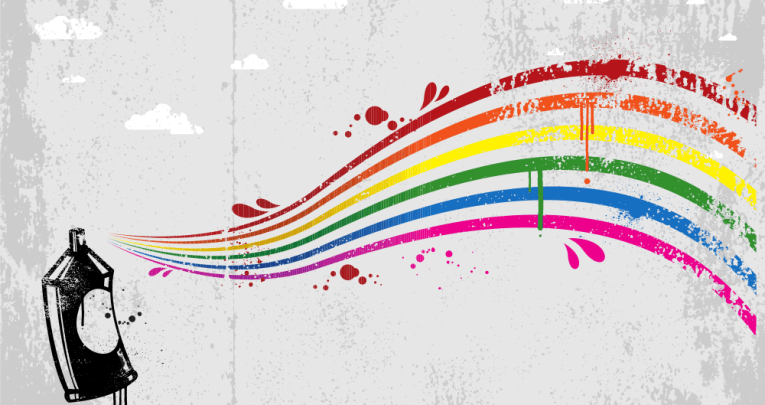
For LGBTQ+ students, hearing stories told by people with real empathy can be hugely empowering, says author Simon James Green…
I was finishing a book signing after a school event when a boy (he was about 14) and his best friend came up to me. I’ve found the kids who need to talk always wait until last, when everyone else has drifted off.
This lad had so much sadness in his eyes – it was heartbreaking. He didn’t say much, so his mate spoke for him. He’d recently come out to his parents, and they weren’t being at all supportive.
“Please, just tell him it won’t always be like this,” the friend implored me.
I was talking to one of the teachers about it afterwards. “They connect with you because you speak so much from your own experience,” she told me.
“It’s so good for the kids who are struggling with their sexuality, school or just life to hear from someone who has been through it and come out the other end, smiling.”
Authentic narratives
The ‘own voices’ argument can be a contentious issue in the writing community, with some authors resenting the notion that they shouldn’t write outside of their experience when it comes marginalised characters.
It’s a complex and nuanced debate. But for me, this isn’t an argument about quality as such – writers constantly put themselves into the lives of others, and have a range of techniques at their disposal to achieve that. Rather, this is about visibility.
When LGBTQ+ kids see LGBTQ+ authors telling LGBTQ+ stories, it’s a particularly powerful thing. These are people who are just like them telling stories from their direct experience – authentic, real, first-hand.
“When LGBTQ+ kids see LGBTQ+ authors telling LGBTQ+ stories, it’s a particularly powerful thing”
It’s important for these teens to know their lives and their stories are valued and valid – and that they should be proud of them.
If you’ve been bullied, if your parents aren’t supportive, if you’ve repeatedly been told that who you are is bad or disgusting, then feeling valued and proud become really important things.
And when gay kids can so often be given the impression they’ll always be unhappy, they also need to see people who are just like them succeeding, leading, and living fulfilling lives.
Engendering pride and positivity is surely one of the most important arguments for supporting own voices books.
Next generation
Meanwhile, at an industry level, publishing needs diversity. Rich, varied experiences make good books, but for all the work many publishers are doing to try and increase LGBTQ+ representation amongst authors, they need the raw material to work with in the first place.
For years, authors of LGBT books were turned away, told that gay stories didn’t sell. You cannot ignore the effect of what turning a group of people away time and time again does. Eventually, those people stop coming.
We need the next generation of LGBTQ+ authors to see that their stories are important, and that they’re wanted. But at the grassroots, they need to see people like them actually doing it.
Gay teens deserve (and need) their heroes too. ‘Own voices’ LGBT books can be the difference between a very well-meaning, ‘I sympathise’ and the genuine connection of a shared experience, that says, “I get it, I’ve been there, you’re not alone.”
And for the kids that feel they are, that can mean the world.
Simon James Green is the author of YA novels Noah Can’t Even and Noah Could Never, published by Scholastic, and out now. Find him at simonjamesgreen.com and on Twitter at @simonjamesgreen.
Discover resources for LGBT History Month. You can also browse resources for Pride Month.










